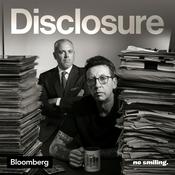65 episodes
- It has been harder to get insight into the dynamics of President Trump’s White House this term compared with the first one, partly because there have been fewer leaks. But after the attack on Venezuela and the administration’s actions in Minneapolis, I’ve found myself wondering: How exactly is Trump making decisions? Who is he listening to? How does this White House work?
Ashley Parker and Michael Scherer cover the Trump administration for The Atlantic and have written a series of big profiles on key figures in this administration. Parker previously won three Pulitzer Prizes for her reporting at The Washington Post.
Mentioned:
“The Wrath of Stephen Miller” by Ashley Parker and Michael Scherer
“‘I Run the Country and the World’” by Ashley Parker and Michael Scherer
“This Is the Real Reason Susie Wiles Talked to Me 11 Times” by Chris Whipple
“Susie Wiles, JD Vance, and the “Junkyard Dogs”: The White House Chief of Staff on Trump’s Second Term (Part 1 of 2)” by Chris Whipple
Book Recommendations:
The Secret History by Donna Tartt
Bel Canto by Ann Patchett
Frankly, We Did Win This Election by Michael C. Bender
An Image of My Name Enters America by Lucy Ives
Palimpsest by Gore Vidal
Blood by Douglas Starr
Thoughts? Guest suggestions? Email us at [email protected].
You can find transcripts (posted midday) and more episodes of “The Ezra Klein Show” at nytimes.com/ezra-klein-podcast, and you can find Ezra on Twitter @ezraklein. Book recommendations from all our guests are listed at https://www.nytimes.com/article/ezra-klein-show-book-recs.
This episode of “The Ezra Klein Show” was produced by Jack McCordick. Fact-checking by Michelle Harris. Our senior engineer is Jeff Geld, with additional mixing by Aman Sahota. Our executive producer is Claire Gordon. The show’s production team also includes Marie Cascione, Annie Galvin, Rollin Hu, Kristin Lin, Emma Kehlbeck, Marina King and Jan Kobal. Original music by Aman Sahota and Pat McCusker. Audience strategy by Kristina Samulewski and Shannon Busta. The director of New York Times Opinion Audio is Annie-Rose Strasser.
Subscribe today at nytimes.com/podcasts or on Apple Podcasts and Spotify. You can also subscribe via your favorite podcast app here https://www.nytimes.com/activate-access/audio?source=podcatcher. For more podcasts and narrated articles, download The New York Times app at nytimes.com/app.
Hosted by Simplecast, an AdsWizz company. See pcm.adswizz.com for information about our collection and use of personal data for advertising. - At the end of January, Trump’s Justice Department released what it said was the last tranche of the Epstein files: millions of pages of emails and texts, F.B.I. documents and court records. Much was redacted and millions more pages have been withheld. There is a lot we want to know that remains unclear.
But what has come into clear view is the role Epstein played as a broker of information, connections, wealth and women and girls for a slice of the global elite. This was the infrastructure of Epstein’s power — and it reveals much about the infrastructure of elite networks more generally.
Anand Giridharadas is something of a sociologist of American elites. He’s the author of, among other books, “Winners Take All: The Elite Charade of Changing the World” and the forthcoming “Man in the Mirror: Hope, Struggle and Belonging in an American City.” He also publishes the great newsletter The.Ink.
Back in November, after the release of an earlier batch of Epstein files, Giridharadas wrote a great Times Opinion guest essay, taking a sociologist’s lens to the messages Epstein exchanged with his elite friends. So after the government released this latest, enormous tranche of materials, I wanted to talk to Giridharadas to help make sense of it. What do they reveal — about how Epstein operated in the world, the vulnerabilities he exploited and what that says about how power works in America today?
Note: This conversation was recorded on Tuesday, Feb. 10. On Thursday, Feb. 12, Kathryn Ruemmler announced she would be resigning from her role as chief legal officer and general counsel at Goldman Sachs.
This episode contains strong language.
Mentioned:
“How the Elite Behave When No One Is Watching: Inside the Epstein Emails” by Anand Giridharadas
“How JPMorgan Enabled the Crimes of Jeffrey Epstein” by David Enrich, Matthew Goldstein and Jessica Silver-Greenberg
“Scams, Schemes, Ruthless Cons: The Untold Story of How Jeffrey Epstein Got Rich” by David Enrich, Steve Eder, Jessica Silver-Greenberg and Matthew Goldstein
Nobody's Girl by Virginia Roberts Giuffre
Book Recommendations:
Random Family by Adrian Nicole LeBlanc
Behind the Beautiful Forevers by Katherine Boo
Unpublished Work by Conchita Sarnoff
Thoughts? Guest suggestions? Email us at [email protected].
You can find transcripts (posted midday) and more episodes of “The Ezra Klein Show” at nytimes.com/ezra-klein-podcast, and you can find Ezra on Twitter @ezraklein. Book recommendations from all our guests are listed at https://www.nytimes.com/article/ezra-klein-show-book-recs.
This episode of “The Ezra Klein Show” was produced by Jack McCordick. Fact-checking by Michelle Harris, with Kate Sinclair and Mary Marge Locker. Our senior engineer is Jeff Geld, mixing by Aman Sahota and Isaac Jones. Our executive producer is Claire Gordon. The show’s production team also includes Marie Cascione, Annie Galvin, Rollin Hu, Kristin Lin, Emma Kehlbeck, Marina King and Jan Kobal. Original music by Pat McCusker and Aman Sahota. Audience strategy by Kristina Samulewski and Shannon Busta. The director of New York Times Opinion Audio is Annie-Rose Strasser.
Subscribe today at nytimes.com/podcasts or on Apple Podcasts and Spotify. You can also subscribe via your favorite podcast app here https://www.nytimes.com/activate-access/audio?source=podcatcher. For more podcasts and narrated articles, download The New York Times app at nytimes.com/app.
Hosted by Simplecast, an AdsWizz company. See pcm.adswizz.com for information about our collection and use of personal data for advertising. - George Saunders is tired of being the “kindness guy.”
Saunders is one of my favorite fiction writers, and a friend of the pod; I talked to him back in 2021 and 2022. He also has a reputation as a kind of guru of kindness, thanks to a viral commencement speech he gave back in 2013. We talked about kindness on the show before.
But with the publication of his new novel, “Vigil,” I noticed that something about Saunders seemed to have shifted. He was pushing back against that public persona, and wrestling with darker themes.
“Vigil” follows an oil tycoon who, on his deathbed, is visited by angels and people from his past asking him to reassess his life. And you can feel a tension in that book that is also very alive in Saunders himself — between recognizing how much of our lives are conditioned by our circumstances and the need to pass judgment to reckon with the truth.
In this conversation, I discuss that tension with Saunders. I ask him about his relationship not just to kindness but also to anger; how he defines sin; whether he believes in free will; and what he thinks lies beyond kindness.
This episode contains strong language.
Mentioned:
Vigil by George Saunders
“What It Means to Be Kind in a Cruel World” by The Ezra Klein Show
“George Saunders Convocation Speech 2013”
“A Tough Question Indeed” by George Saunders
East West Street by Philippe Sands
“When Is It Genocide?” by The Ezra Klein Show
Book Recommendations:
I Will Bear Witness, Volume 1 by Victor Klemperer
Red Cavalry and Other Stories by Isaac Babel
The Place of Tides by James Rebanks
Thoughts? Guest suggestions? Email us at [email protected].
You can find transcripts (posted midday) and more episodes of “The Ezra Klein Show” at nytimes.com/ezra-klein-podcast, and you can find Ezra on Twitter @ezraklein. Book recommendations from all our guests are listed at https://www.nytimes.com/article/ezra-klein-show-book-recs.
This episode of “The Ezra Klein Show” was produced by Annie Galvin. Fact-checking by Michelle Harris. Our senior engineer is Jeff Geld, with additional mixing by Aman Sahota, Efim Shapiro and Isaac Jones. Our executive producer is Claire Gordon. The show’s production team also includes Marie Cascione, Rollin Hu, Kristin Lin, Emma Kehlbeck, Jack McCordick, Marina King and Jan Kobal. Original music by Aman Sahota and Pat McCusker. Audience strategy by Kristina Samulewski and Shannon Busta. The director of New York Times Opinion Audio is Annie-Rose Strasser.
Subscribe today at nytimes.com/podcasts or on Apple Podcasts and Spotify. You can also subscribe via your favorite podcast app here https://www.nytimes.com/activate-access/audio?source=podcatcher. For more podcasts and narrated articles, download The New York Times app at nytimes.com/app.
Hosted by Simplecast, an AdsWizz company. See pcm.adswizz.com for information about our collection and use of personal data for advertising. - Ragebait, sponcon, A.I. slop — the internet of 2026 makes a lot of us nostalgic for the internet of 10 or 15 years ago.
What exactly went wrong here? How did the early promise of the internet get so twisted? And what exactly is wrong here? What kinds of policies could actually make our digital lives meaningfully better?
Cory Doctorow and Tim Wu have two different theories of the case, which I thought would be interesting to put in conversation together. Doctorow is a science fiction writer, an activist with the Electronic Frontier Foundation and the author of “Enshittification: Why Everything Suddenly Got Worse and What to Do About It.” Wu is a law professor who worked on technology policy in the Biden White House; his latest book is “The Age of Extraction: How Tech Platforms Conquered the Economy and Threaten Our Future Prosperity.”
In this conversation, we discuss their different frameworks, and how they connect to all kinds of issues that plague the modern internet: the feeling that we’re being manipulated; the deranging of our politics; the squeezing of small businesses and creators; the deluge of spam and fraud; the constant surveillance and privacy risks; the quiet rise of algorithmic pricing; and the dehumanization of work. And they lay out the policies that they think would go furthest in making all these different aspects of our digital lives better.
Mentioned:
Enshittification by Cory Doctorow
The Age of Extraction by Tim Wu
“Fighting Enshittification” by Josh Richman
Book Recommendations:
Small Is Beautiful by E. F. Schumacher
Manipulation by Cass R. Sunstein
The Rise and Fall of the Great Powers by Paul Kennedy
Careless People by Sarah Wynn-Williams
Little Bosses Everywhere by Bridget Read
Jules, Penny & the Rooster by Daniel Pinkwater
Thoughts? Guest suggestions? Email us at [email protected].
You can find transcripts (posted midday) and more episodes of “The Ezra Klein Show” at nytimes.com/ezra-klein-podcast, and you can find Ezra on Twitter @ezraklein. Book recommendations from all our guests are listed at https://www.nytimes.com/article/ezra-klein-show-book-recs.
This episode of “The Ezra Klein Show” was produced by Annie Galvin. Fact-checking by Will Peischel. Our senior engineer is Jeff Geld, with additional mixing by Isaac Jones and Aman Sahota. Our executive producer is Claire Gordon. The show’s production team also includes Marie Cascione, Rollin Hu, Kristin Lin, Emma Kehlbeck, Jack McCordick, Michelle Harris, Marina King and Jan Kobal. Original music by Pat McCusker. Audience strategy by Kristina Samulewski and Shannon Busta. The director of New York Times Opinion Audio is Annie-Rose Strasser. And special thanks to Natasha Scott.
Subscribe today at nytimes.com/podcasts or on Apple Podcasts and Spotify. You can also subscribe via your favorite podcast app here https://www.nytimes.com/activate-access/audio?source=podcatcher. For more podcasts and narrated articles, download The New York Times app at nytimes.com/app.
Hosted by Simplecast, an AdsWizz company. See pcm.adswizz.com for information about our collection and use of personal data for advertising. - My motivation for this episode is personal. One of my resolutions this year is to spend more time hosting and to make those gatherings more meaningful.
I think a lot of us wish we had better social lives and a stronger feeling of community around us. But it’s hard. We’re busy, we’re tired, and social planning and hosting can feel like just more work. So I asked Priya Parker on the show to help.
Parker is the author of “The Art of Gathering: How We Meet and Why It Matters” and a wonderful Substack, Group Life. She’s also a conflict resolution facilitator. And she just thinks about gathering and hosting in a different way from anyone else I’ve ever met. For her, it’s about more than just throwing a great dinner party; it’s about how we build community across differences, all the way up to how gathering can help create a better politics. The way Zohran Mamdani’s mayoral campaign thought about community and built community among its volunteers was partly based on her work and advice.
This episode is a bit of a break from politics — but also not. Because pulling the people we love closer and spending more time together rather than alone are as essential as any political or civic discipline could be right now.
This conversation contains strong language.
Mentioned:
In Defense of Politics by Bernard Crick
I And Thou by Martin Buber
The Loneliness of Sonia and Sunny by Kiran Desai
“Adorable Little Detonators” by Allison P. Davis
“The Accused” by Katie J.M. Baker
“The Black Thought Project” by Alicia Walters
“Zohran’s Smile” by Anand Giridharadas
Book Recommendations:
The Politics of Ritual by Molly Farneth
On Repentance and Repair by Danya Ruttenberg
BoyMom by Ruth Whippman
Talk to Your Boys by Christopher Pepper and Joanna Schroeder
Thoughts? Guest suggestions? Email us at [email protected].
You can find transcripts (posted midday) and more episodes of “The Ezra Klein Show” at nytimes.com/ezra-klein-podcast, and you can find Ezra on Twitter @ezraklein. Book recommendations from all our guests are listed at https://www.nytimes.com/article/ezra-klein-show-book-recs.
This episode of “The Ezra Klein Show” was produced by Annie Galvin. Fact-checking by Michelle Harris with Mary Marge Locker and Kate Sinclair. Our senior engineer is Jeff Geld, with additional mixing by Aman Sahota. Our executive producer is Claire Gordon. The show’s production team also includes Marie Cascione, Rollin Hu, Kristin Lin, Emma Kehlbeck, Jack McCordick, Marina King and Jan Kobal. Original music by Pat McCusker. Audience strategy by Kristina Samulewski and Shannon Busta. The director of New York Times Opinion Audio is Annie-Rose Strasser.
Subscribe today at nytimes.com/podcasts or on Apple Podcasts and Spotify. You can also subscribe via your favorite podcast app here https://www.nytimes.com/activate-access/audio?source=podcatcher. For more podcasts and narrated articles, download The New York Times app at nytimes.com/app.
Hosted by Simplecast, an AdsWizz company. See pcm.adswizz.com for information about our collection and use of personal data for advertising.
More Government podcasts
Trending Government podcasts
About The Ezra Klein Show
Ezra Klein invites you into a conversation on something that matters. How do we address climate change if the political system fails to act? Has the logic of markets infiltrated too many aspects of our lives? What is the future of the Republican Party? What do psychedelics teach us about consciousness? What does sci-fi understand about our present that we miss? Can our food system be just to humans and animals alike?
Subscribe today at nytimes.com/podcasts or on Apple Podcasts and Spotify. You can also subscribe via your favorite podcast app here https://www.nytimes.com/activate-access/audio?source=podcatcher.
Podcast websiteListen to The Ezra Klein Show, The Lawfare Podcast and many other podcasts from around the world with the radio.net app

Get the free radio.net app
- Stations and podcasts to bookmark
- Stream via Wi-Fi or Bluetooth
- Supports Carplay & Android Auto
- Many other app features
Get the free radio.net app
- Stations and podcasts to bookmark
- Stream via Wi-Fi or Bluetooth
- Supports Carplay & Android Auto
- Many other app features


The Ezra Klein Show
Scan code,
download the app,
start listening.
download the app,
start listening.












































